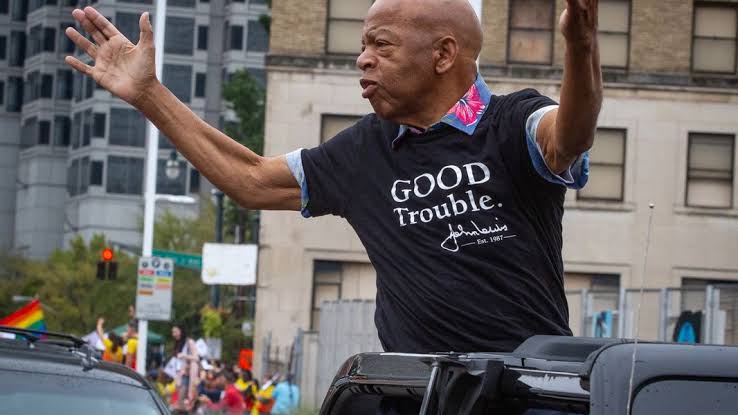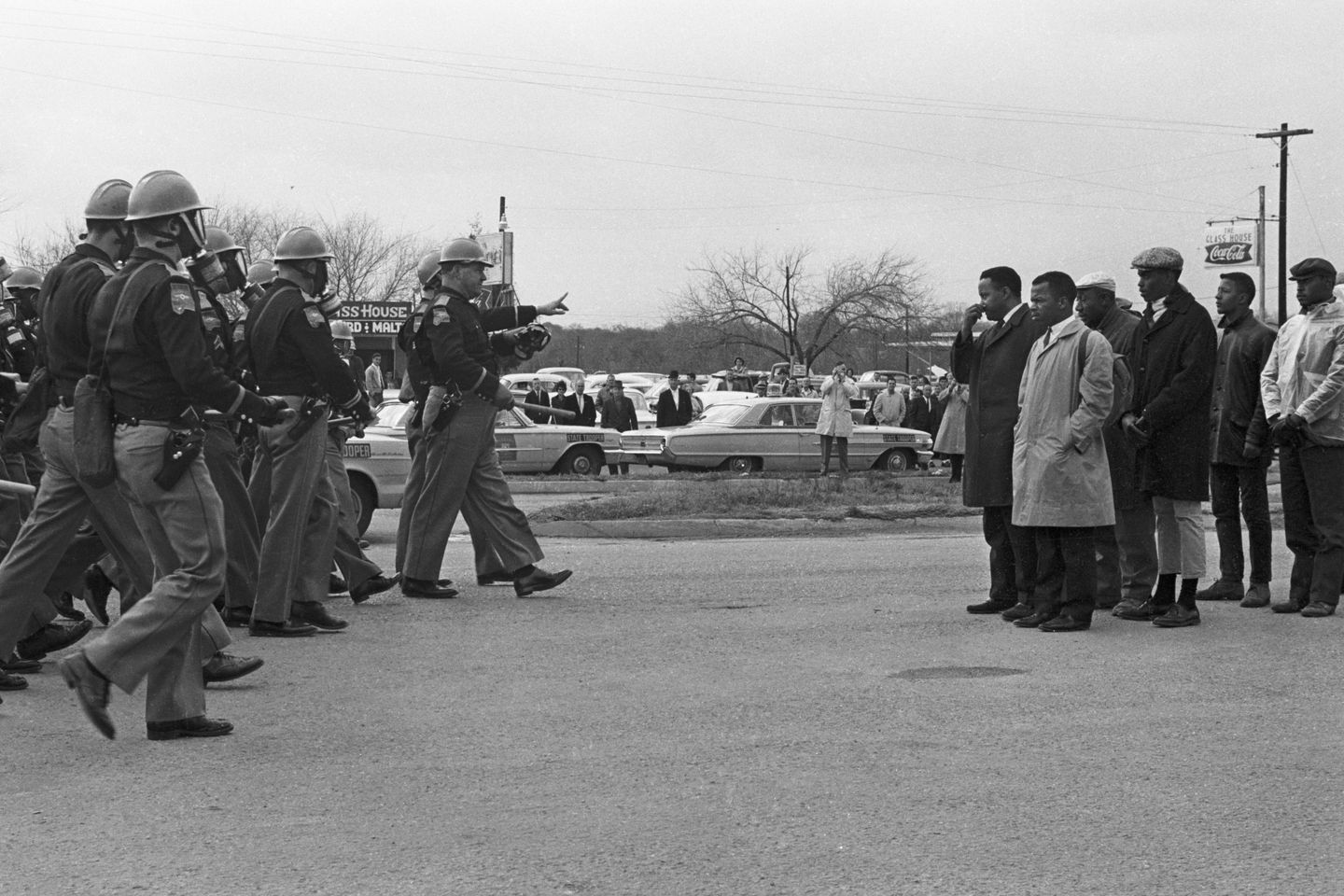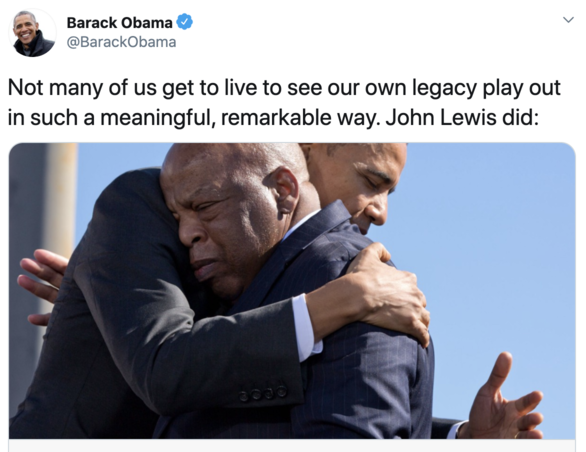
By Victoria Jul, 20, 2020 Featured
John Lewis, the son of the Alabama sharecropper, who is known as a frontline freedom fighter has died at age 80 after fighting cancer for six months. The news of his death was released by his family members and according to them, he died on Friday, July 17, 2020.
In 1965, Lewis had once suffered severe injuries after he was beaten black and blue by an Alabama police troop during a nonviolent protest targeted against the marginalization of voters' rights. The incident that followed the protest earned it the name “Bloody Sunday.” The pictures of his bashed body went viral and catapulted him into Congress.

In Congress, Lewis antagonized the Jim Crow's era for its sheer infringement on civil rights. He shows his displeasure by his advocating for nonviolent change. Irrespective of his incessant arrest, he never stops fighting for what he believes in. This is part of what earned him the name "the Conscience of Congress, "
Also in Congress, he voted against the Iraq War and Gulf War of 1991 and 2003. He also advocated for the gun control legislation through a sit-in on the House floor and worked on improving the health care for the poor people in the American States. Lewis also fought for the voting rights of the poor. Added to this, he fought to protect welfare benefits from cuts and many more.
Before his death, in December, Lewis announced that doctors had discovered that he had stage 4 pancreatic cancer. During the announcement, he expressed his determination to fight cancer. He said: "I have been in some kind of fight -- for freedom, equality, basic human rights -- for nearly my entire life. I have never faced a fight quite like the one I have now...I have decided to do what I know to do and do what I have always done: I am going to fight it and keep fighting for the Beloved Community. We still have many bridges to cross. ... With God’s grace, I will be back on the front lines soon. Please keep me in your prayers as I begin this journey.”
While battling with cancer, Lewis put in for reelection to the 18th term in Congress and was determined to push forward the ongoing protest against racial discrimination. In fact, he paid a visit to a 2-block-long asphalt canvas on Washington’s 16th Street that says “BLACK LIVES MATTER” in giant yellow letters and expressed his grief for the brutal killings of George Floyd and others in Fox News Reporter:
’It’s very moving. Very moving. Impressive… I think the people in D.C. and around the nation are sending a mightily powerful and strong message to the rest of the world that we will get there.”
A week before his death, he tweeted against the Trump administration centering his argument on Trump's refusal to continue his plan to grant visas to international students who have been engaging in online classes ever since the outbreak of the coronavirus pandemic.
However, six months after finding out that he lives with cancer, he died. The statement released by his family reads "It is with inconsolable grief and enduring sadness that we announce the passing of U.S. Rep. John Lewis," his family said in a statement. "He was honored and respected as the conscience of the US Congress and an icon of American history, but we knew him as a loving father and brother. He was a stalwart champion in the on-going struggle to demand respect for the dignity and worth of every human being. He dedicated his entire life to non-violent activism and was an outspoken advocate in the struggle for equal justice in America. He will be deeply missed."
It is important to note that Lewis died the same day with Rev Cordy Tindell "C.T" Vivian who was also a civil rights leader. Tindell died at age 95. The dual death of these two icons at a time when the country is still grappling with pandemic and movement against racial injustice came as a great loss to the nation.
In the announcement made by the House Speaker, Nancy Pelosi, he said:
"Today, America mourns the loss of one of the greatest heroes of American history: Congressman John Lewis, the Conscience of the Congress," the California Democrat said.
Also, following the news of his death, on Saturday, President Donald Trump made a degree that all the U.S flag “at the White House and upon all public buildings and grounds, at all military posts and naval stations, and on all naval vessels of the Federal Government in the District of Columbia and throughout the United States and its Territories and possessions” be flown at half-staff in Lewis’ honor.
About John Lewis
John Lewis is a Democrat who has been serving in Congress for more than three decades. He serves as the US representative for Georgia's 5th Congressional District. His uprightness and dedication earned him the title "the conscience of Congress". However, despite being a prolific freedom fighter, Lewis revealed that he has been arrested more than 40 times while demonstrating against racial and social injustice.
John Robert Lewis was born on February 23, 1940, to the family of Willie Mae and Eddie Lewis in Pike County, Alabama. He spends his near childhood days with his parents on the Family's cotton farm and attended all-Blacks Public Schools.
When John was a little boy, his dream was to become a minister. In a StoryCorps segment that aired on NPR, he said: “With the help of my brothers and sisters and cousins, we would gather all of our chickens in the chicken yard, and I would start preaching to the chickens. They never quite said ‘Amen.”
The beginning of Lewis' career as a civil right fighter
In 1955, at age 15, an encounter changed Lewis's initial dream. Lewis witnessed how a black woman Rosa Parks' refused to sit at the back of a bus in Montgomery, Alabama as laid down by Jim Crow's practices. Jim Crow's Era is popular for its intense racial injustice. Rosa Parks' action triggered his interest in civil rights.
Two years later, upon finishing his college, he wrote to Rev Martin Luther King Jr. to join in the struggles against the acute injustice at this period. In response to his letter, King sent him a bus ticket to Montgomery.
“I was so scared. I didn’t know what to say or what to do,” Lewis recalled on StoryCorps. “And Dr. King said, ’Are you the boy from Troy? And I said, ‘Dr. King, I am John Robert Lewis.’ I gave my whole name. But he still called me the ‘boy from Troy.”
Later he got admission into Fisk University where he obtained a B.A. in religion and philosophy. After this, he went to the American Baptist Theological Seminary in Nashville, Tennessee.
At the age of 23, Lewis became a follower and colleague of the great freedom fighter, Martin Luther King. At this age, he had joined the Freedom Riders in challenging segregated buses and was already engaging in different lunch counter sit-ins. He also became a keynote speaker at the historic 1963 March on Washington the same place where King delivered his most popular speech " I have a dream."
“We march today for jobs and freedom, but we have nothing to be proud of,” Lewis told the sea of 250,000 people at the Lincoln Memorial. “For hundreds and thousands of our brothers are not here. They are receiving starvation wages or no wages at all. While we stand here, there are sharecroppers in the Delta of Mississippi who are out in the fields working for less than $3 a day, 12 hours a day. ... We are tired. We are tired of being beaten by policemen. We are tired of seeing our people locked up in jail over and over again. ...
“We want our freedom and we want it now,” he continued. “We do not want to go to jail. But we will go to jail if this is the price we must pay for love, brotherhood, and true peace. I appeal to all of you to get into this great revolution that is sweeping this nation. Get in and stay in the streets of every city, every village, and the hamlet of this nation until true freedom comes. ... By the force of our demands, our determination, and our numbers, we shall splinter the segregated South into a thousand pieces and put them together in the image of God and democracy. We must say: ‘Wake up America! Wake up!’ For we cannot stop, and we will not and cannot be patient.”
In the following year, during the "Mississippi Burning" Freedom Summer, he led the community action program and the voter registration drives.
At age 25, he was already heading the Student Nonviolent Coordinating Committee. He organized over 600 persons to plan a nonviolent march of about 54 miles from Selma to Montgomery. The aim of the march is to press for voting rights for African Americans.
However, the March which was held on March 7, 1965, became known as "Bloody Sunday" as most of the protesters were beaten and bashed by policemen when the troopers got to the Edmund Pettus Bridge. About 150 policemen charged against the protesters firing tear gas and hitting them with their bullwhips and clubs. Since most of the policemen were on horseback, they beat and injured a lot of the protesters. Among the 58 people who were injured and treated afterward was John Lewis, who suffered a fractured skull after being hit by a billy club by the policemen.
In his tweet 51 years later, Lewis recalled that “I was hit in the head by a State Trooper… I thought I saw death. I thought I was going to die.”
Before his death, Lewis never missed the commemoration of the attack. He always returned to the bridge to do this and even visited the bridge on March 1, 2020, despite ailing.
During the march, he admonished the crowd that “We must keep the faith, keep our eyes on the prize. We must go out and vote like we never, ever voted before," his voice as powerful as ever.
“All these many years later, I don’t recall how I made it back across the bridge to the church,” he recalled on “Oprah’s Master Class.” “I do recall being in the church. They asked me to say something to the audience, and I stood up and said something like ‘I don’t understand how President Johnson can send troops to Vietnam and cannot send troops to Selma, Alabama, to protect people whose only desire is to register to vote.”
Five months after the Bloody Sunday incident, Lewis and King's quest was met when on August 6, 1965, President Lyndon Johnson signed the Voting Rights Act with Lewis and King in attendance. After the victory, Lewis framed the pen the president used in signing in the Act and hung it in his living room.
In 1966, after leaving SNCC, Lewis became the director of the Voter Education Project. While in office he helped more than 4 million people register to vote. After 11 years, he lost a bid to represent Georgia’s 5th Congressional District. However, he was appointed by President Jimmy Carter to head a federal volunteer agency called "ACTION"
Lewis was later elected to the Atlanta City Council in 1981 and to the U.S. House in 1986. Prior to this, he had been at war with Julian Bond over the Democratic primary. During his campaign against Bond, Bond was accused of using cocaine. Lewis took a blood test to show that he doesn't do drugs and challenged Bond to do the same. The latter could not thereby giving Lewis an edge over him.
When he got into Congress, he adopted the liberal approach to fighting for civil rights. In 1966, he became an antagonist of President Bill Clinton's tightening of rules for welfare benefits.
“How can any person of faith, of conscience vote for a bill that puts a million more kids into poverty? Where is the compassion, where is the sense of decency, where is the heart of this Congress?” Lewis asked during the debate. “What does it profit a great nation to conquer the world, only to lose its soul?”
Lewis fought against the 1991 and 2003 Gulf war and boycotted the inauguration of President George Bush. In 2016, he was arrested countless times over his embassy protest and the sit-in he led.
“My philosophy is very simple: When you see something that is not right, not fair, not just, you have to stand up and just say something, you have to do something,” he said on StoryCorps. “I got into good trouble, necessary trouble. Even today, I tell people, ‘We need to get in good trouble.”
Lewis's nonviolent approach to handling civil rights issues helped him earn most of the success he was able to attain today. According to him:
“Rioting, looting, and burning is not the way,” he tweeted during the demonstrations days after Floyd’s death. “Be constructive, not destructive.”
“In these days that seem to be so dark, I think the spirit of history is still leading us and guiding us,” Lewis told opinion writer Renkl during a 2016 trip to Nashville. “Call it what you may, but I believe that somehow, in some way, good is going to prevail. And out of some of the darkest hours, there will be daybreak. There will be light. And we will get there. You have to believe it. You have to believe in your guts that it’s going to be OK.”
In his statement on his civil right movement, he said:
"Sometimes when I look back and think about it, how did we do what we did? How did we succeed? We didn't have a website. We didn't have a cellular telephone."
"But I felt when we were sitting on those lunch counter stools, or going on the Freedom Ride, or marching from Selma to Montgomery, there was a power and a force. God Almighty was there with us."
Number of years in Congress.
Lewis served in Congress from 1986 till his death. He served 34 years for 17-terms. During his service, his uprightness and devotion earned him the name "conscience of Congress"
In 2011, after serving on the frontline of civil right issues for more than 50 years, Lewis earned the nation's highest civilian honor which is the Presidential Medal of Freedom
He also served as the Chairman of the Student Nonviolent Coordinating Committee (SNCC) from 1963 to 1966.
John Lewis cause of death
The major cause of his death is pancreatic cancer. Lewis already lost his wife of 44 years in 2012. Among his survivors is their son John-Miles Lewis. He died on July 17, 2020, he was 80 years old.

Obama and Trump's reaction to John Lewis death
Upon hearing the news of Lewis death, Donald Trump, the current president of the United States took to his Twitter to express his sadness:
"Saddened to hear the news of civil rights hero John Lewis passing. Melania and I send our prayers to him and his family."
On the same day, he also ordered that the nation's flag in the White House and all federal buildings be lowered to half-staff.
Obama, the ex-president of the United States, reacted to the news on Lewis's death in a statement which reads that the civil rights icon will "continue, even in his passing, to serve as a beacon" in America's journey towards a more perfect union.
He added that Lewis "loved this country so much that he risked his life and his blood so that it might live up to its promise. And through the decades, he not only gave all of himself to the cause of freedom and justice but inspired generations that followed to try to live up to his example."
Tags: John Lewis Freedom fighter Civil Rights Voting Rights
Share On Facebook Twitter Linkedin Whatsapp Telegram
Categories
Latest Post
- Nigeria Taps Global Markets with $2.25B Eurobond Sale
- Boeing Shares Rise as CEO Confirms China Deliveries to Resume Next Month
- STOCK SPOTLIGHT: UNION HOMES REAL ESTATE INVESTMENT TRUST (UHREIT)
- Nvidia Q1 2025 Earnings Report Summary
- 📉 U.S. Market Summary – May 28, 2025
- CBN Launches New Financial Tools to Boost Nigeria’s Non-Interest Banking Sector! ✨
- Market Watch: Key Updates as Wall Street Awaits Nvidia and Salesforce Earnings
- U.S. Equity Markets Rally as EU Tariff Deadline Is Extended and Consumer Confidence Surges
- Things to Know Before the U.S. Stock Market Opens
- What to Expect in the Markets This Week (May 27–31)

Start investing with Acorns today! Get $5 when you use my invite link: Z24WWE
